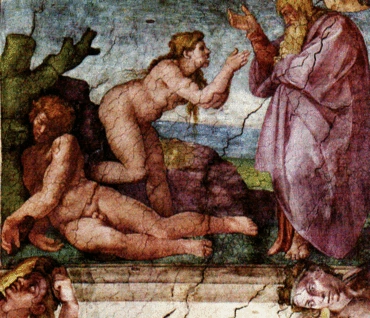Explanation of Genesis 2:23
By Brian David

The celestial people of the Most Ancient Church, motivated by the love of the Lord, were in a constant state of sensing the separation between their internals and their externals. They could be externally involved with the necessities of life – gathering and preparing food, caring for children, caring for each other – while deep in their minds being constantly aware of the Lord, and of angels, and of the spiritual value of even the external things they were doing. But to give them the sense that life was their own, the Lord had to emphasize their externals and give them the leading role. So the people lost their constant awareness of spiritual things.
That is represented here. "Bone of my bones" means that the dead, hellish sense of self in external life was linked to the same thing in internal life. "Flesh of my flesh" means the living, heavenly sense of self in externals is also linked to internals. "Woman" means the sense of self as a complete state of life, and "man" – used in a specifically masculine sense here – means intellectual thoughts and concepts in the internal man. So at all levels, the external sense that life was their own took dominance in the people of the Most Ancient Church.
(References: Arcana Coelestia 156, 0157, 158, 159)
Arcana Coelestia #1988
1988. 'Abram was a son of ninety-nine years' means the period of time before the Lord fully joined the Internal Man to the Rational Man. This is clear from the meaning of 'nine' when thought of as one less than ten, or what amounts to the same, of 'ninety-nine' when thought of as one less than a hundred; for when Isaac was born to him Abram was a hundred years old. The nature of the internal sense of the Word is made especially clear by the numbers that are used, as it is by the names. Any numbers whatever, as also any names, that are mentioned in the Word mean real things; for nothing ever exists in the Word that does not have that which is Divine within it, that is, which does not have an internal sense within it. How remote this sense is from the sense of the letter is especially evident from the names and numbers, for in heaven they pay no attention whatever to names and numbers but to things meant by the names or numbers. For example, whenever the number seven occurs, holiness instantly suggests itself to angels instead of the number seven, for 'seven' means holiness from the fact that the celestial man is the seventh day or the sabbath, and so the Lord's rest, 84-87, 395, 433, 716, 881. The same applies to all other numbers, for example, to the number twelve. Whenever twelve occurs the idea of everything belonging to faith suggests itself to angels, for the reason that the twelve tribes of Israel meant everything belonging to faith, 577. That numbers mean real things in the Word has been shown in Volume One; see 482, 487, 488, 493, 575, 647, 648, 755, 813, 893.
[2] It is similar with the number 'ninety-nine'. That this number means the period of time before the Lord fully joined the Internal Man to the Rational Man is clear from the meaning of 'a hundred years', Abram's age when Isaac was born to him, for Isaac represents and means the Lord's Rational Man which was joined to His Internal, that is, to the Divine. In the Word 'a hundred' has the same meaning as ten, for that number is the product of ten multiplied by ten, and 'ten' means remnants, as shown in Volume One, in 576. For what remnants residing with man are, see 468, 530, 561, 660, 1050, and for what remnants residing with the Lord were, 1906. These arcana cannot be explained any further, but anyone can find out for himself once he has acquainted himself with what remnants are - for nowadays what they are is not known - provided it is realized that by remnants residing with the Lord are meant the Divine Goods which He acquired to Himself by His own power, and by which He united the Human Essence to the Divine Essence.
[3] These considerations show what is meant by 'ninety-nine'. Being one less than a hundred, that number means the period of time before the Lord fully joined the Internal Man to the Rational Man. 'Ishmael' represented the first rational with the Lord, the nature of which has been shown adequately enough above in the previous chapter. But 'Isaac' represents the Lord's Divine Rational, as will be clear later on. Anyone may see that an arcanum is embodied within the following circumstance: Abram having remained such a long time in the land of Canaan - twenty-four years now, ten before Ishmael's birth, and thirteen after - and not as yet having had a son by Sarai his wife, he then first received the promise of a son, when he had now reached ninety-nine and would be a hundred when this son was born. The arcanum is that by means of these experiences he might represent the union of the Lord's Divine Essence with His Human Essence, and in fact of His Internal Man, which was Jehovah, with His Rational.






